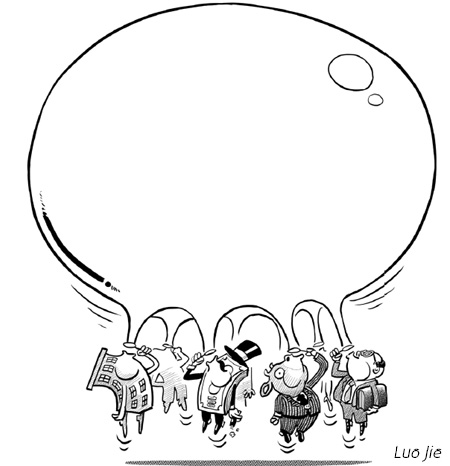Managing inflation expectations smartly
The need to manage inflation expectations as proposed by the State Council, the country's cabinet, suggests that the decision-makers have developed a forward view on the risks of potential inflation, which is a timely and helpful move.
To manage inflation expectations, the government should regulate the controllable factors in advance and appropriately guide market views on the trend of these factors, including expectations on domestic monetary policy (especially money supply growth and real interest rate), fiscal policy, the government's intervention in the stock and housing markets, land supply and policies affecting global liquidity conditions. First, the current year-on-year growth rate of M2 surpassed nominal GDP growth rate in the first three quarters by 23 percentage points and credit growth, by 27 percentage points, signaling obvious excessive liquidity.
Though the overcapacity of manufacturing and bumper harvests could partly constrain prices of some industrial and agricultural products, consumers cannot believe that excessive liquidity (currency) would not purchase goods or property, given the unprecedented monetary credit growth. Excess liquidity is the major cause of inflation expectations. Since the growth rate of M2 and credit is controllable, if it could be steadily slowed down in the future, inflation expectations can be restrained.
Moreover, the credibility of monetary policy should be improved. The 17 percent growth rate of M2 declared at the beginning of this year has been exceeded substantially because of the approval of overfull government-dominated projects and the acceleration in project implementation. In 2010, if government policies are not coordinated effectively and the growth targets for money and credit are once again not adhered to, then monetary policy will lose credibility and inflation expectations may worsen.
The prospect of real interest rates could also impact the expectations and actions of consumers and investors. After the formation of inflation expectations, if consumers believe that deposit rates will not change (or rise too slowly) and so real interest rates will become negative, they would tend to withdraw their deposits and invest in housing or stock markets to hedge against the erosion of purchasing power. This could create a bubble in the assets market especially the property market and will eventually pass through to CPI via higher rental costs.
So it is necessary to begin raising interest rates gradually when inflation gets closer to the level of annual deposit rate (2.25 percent). This could give the market a signal that the central bank would intend to keep real interest rates positive. This signal will be conducive to weakening market expectations of negative deposit rates and rising property prices, and thus help stabilize the asset market.
Some people argue that if China raises interest rates ahead of the US, there will be an influx of hot money. I disagree. Even though China raises the RMB interest rate by 1 percentage point, the return brought by rising interest rates is still far less than the returns from the real estate or stock market given the current trend. So the change of interest rates is not the main cause of hot money flows. To the contrary, rising interest rates could slow down the increase in housing and stock prices, which may reduce the incentive for speculation to put money in China.
In addition, the policy statements in the next few months should stress more on "flexibility" rather than not "stability", in order to give room for future change of policy stance from "expansionary" to "neutral".
Second, an expansionary fiscal policy would increase gross demand, which also is an important factor that causes inflation expectations. Currently, as China's GDP growth has exceeded the expected 8 percent goal, the expansionary fiscal policy should be withdrawn in time.
I think the growth target of capital expenditure of the central and local governments in 2010 should slow down. For example, the central government originally planned to allocate 600 billion yuan next year, 20 percent more than this year's 500 billion yuan under the $586-billion stimulus package. It should consider lengthen the period of fiscal allocation from one year to one and half years (400 billion yuan in 2010 and 200 billion yuan in the first half of 2011). With regard to local government investment, their capital expenditure growth should be constrained within 10 percent by tighter control on project approvals.
Controlling the growth rate of capital expenditures could help stabilize inflation expectations and improve the creditability of monetary policies.
Third, in the field of real estate, the frequent emergence of "land kings" has made people feel that the increase in housing prices will be unstoppable. Many effective measures, such as increasing land supply, controlling bank lending and combating land hoarding, should be taken to control land prices.
Fourth, compared with the developed countries, Chinese regulators often employ "bailout" measures in the face of stock and housing markets' downturn. So most Chinese investors have a high hope that the government would not just stand by when markets decline. This perception tends to fuel the asset market bubbles. I believe that the government should declare at appropriate times that it would gradually reduce intervention in the capital market and contain people's anticipation on official rescues.
Fifth, the excessive liquidity caused by the zero interest rate and quantitative easing in the US are the main reasons why prices of commodities (including oil, metals and agricultural products) are rising. Global investors are funding their carry trades with the very cheap US dollar. Seeing the rising futures prices, suppliers and corporates in the real economy are also tempted to hoard these products, which can then raise the prices of spot commodities. The rising prices of commodities will inevitably reflect on domestic producer and consumer indices.
China has little influence on global liquidity, but it can put pressure on the US, through G20 or bilateral discussions, not to indefinitely postpone the withdrawal of expansionary policy.
The author is the chief economist for Greater China at Deutsche Bank.

 0 Comments
0 Comments






